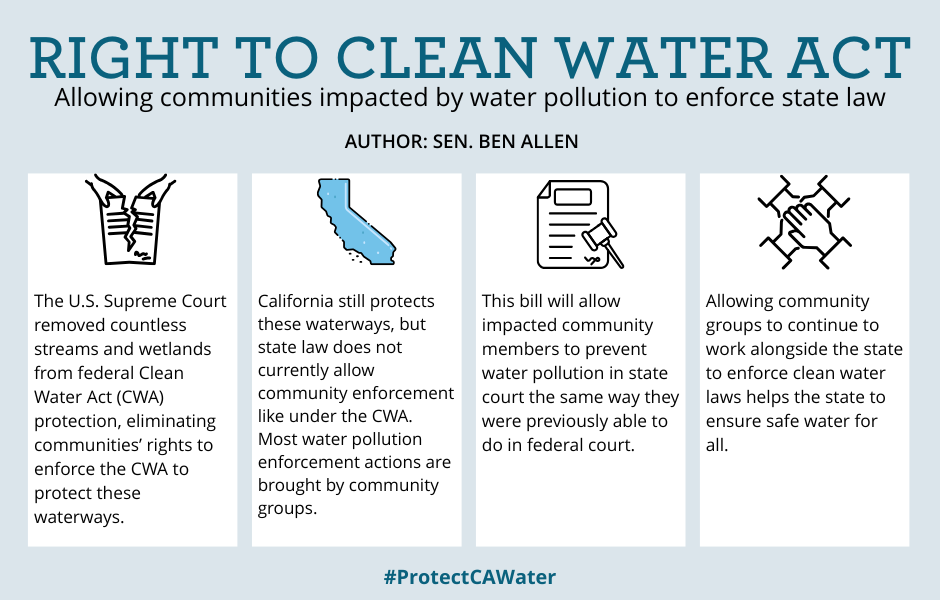
Have you ever witnessed water pollution and thought: I wish I could make that stop? What if we told you that you can?
The Clean Water Act is our nation’s cornerstone water pollution law. The Clean Water Act’s objective is to “restore and maintain the chemical, physical, and biological integrity of the Nation’s waters.” The Act set a national goal of eliminating the discharge of pollutants by 1985.
These aims are ambitious, and Congress knew that government oversight would not be enough. So Congress included an inspired enforcement mechanism in the Clean Water Act: the citizen suit provision. This provision empowers individuals, like you or me, or organizations, like California Coastkeeper Alliance, who have been harmed by a clean water violation to file a lawsuit against the alleged polluter. This provision puts the fight for clean water in the hands of the people, as well as with the government.
But the citizen suit provision comes with safeguards to ensure it is used responsibly. At least sixty days before filing a lawsuit, citizens must provide proper notice of the violation by sending detailed letters to alleged polluters and relevant agencies to (1) give violators the opportunity to fix their issues without the need for litigation and (2) give the government the chance to step in and take over the enforcement.
Since the Clean Water Act’s enactment in 1972, community enforcement has been an important piece of the water quality puzzle. Community enforcement has helped protect fishable, swimmable, drinkable waters statewide. For example, in San Diego, a community enforcement action led to a multi-beneficial agreement between the City of San Diego and four environmental groups requiring the City to implement a large-scale water recycling project to produce at least 83 million gallons per day of clean, pure drinking water for San Diego residents by 2035. In Los Angeles, community action led to a 90% decrease in sewage pollution discharged into Santa Monica Bay allowing beachgoers the ability to safely swim without getting sick. In San Francisco, a community action led to the removal of a collection of leaking, toxic, mothballed military ships from Suisun Bay making it safer to fish in the Bay. And in Humboldt County, a community action helped stop pulp mills from dumping of millions of gallons of untreated chemical waste into the ocean.
Community enforcement is essential, and now more than ever amidst dramatic cuts to environmental enforcement agencies. CCKA’s 2018 report also details how citizen enforcement actions can outpace governmental enforcement actions, which is an unfortunate but realistic reflection of agency resource constraints. As government resources are insufficient to address all instances of noncompliance, citizen suits help fill the gap and ensure our waters remain protected.
Clean water should not be a partisan issue. The Clean Water Act was a bipartisan effort and CCKA’s 2018 Citizen Suit Report highlights continued public support for community. California voters overwhelmingly support the state preserving the citizen suit provision of the Clean Water Act should the federal government remove environmental protections. More than three-quarters (76%) of voters support the proposal – nearly three in five (59%) “strongly.”
The Clean Water Act’s citizen suit provision is more than just a legal formality: it is a remarkable testament to the idea that environmental stewardship is a shared responsibility. But the Clean Water Act and its community enforcement provision are under attack. A 2023 U.S. Supreme Court decision dramatically reduced the Clean Water Act’s reach and a forthcoming federal rulemaking is expected to serve another blow.
California Coastkeeper Alliance will not stand by and let our waters be stripped of crucial protections, nor our communities stripped of their ability to fight back against water pollution.
That is why California Coastkeeper Alliance teamed up with Defenders of Wildlife and Senator Ben Allen to introduce Senate Bill 601: The Right to Clean Water Act. The bill would restore long-enjoyed federal Clean Water Act protections—including community enforcement—into state law so the protections will no longer ebb and flow with variable national politics.
SB 601 will be heard in the Senate Judiciary committee on April 29.
Stay informed of CCKA’s legislative work and support our efforts to protect California’s waters by subscribing to California Coastkeeper Alliance’s monthly newsletter, becoming a lifetime CCKA member, and following us on social media: @CA_Waterkeepers.
Senior Staff Attorney Lauren Chase Marshall advances CCKA’s water quality initiatives via administrative, litigation, and legislative tools.



